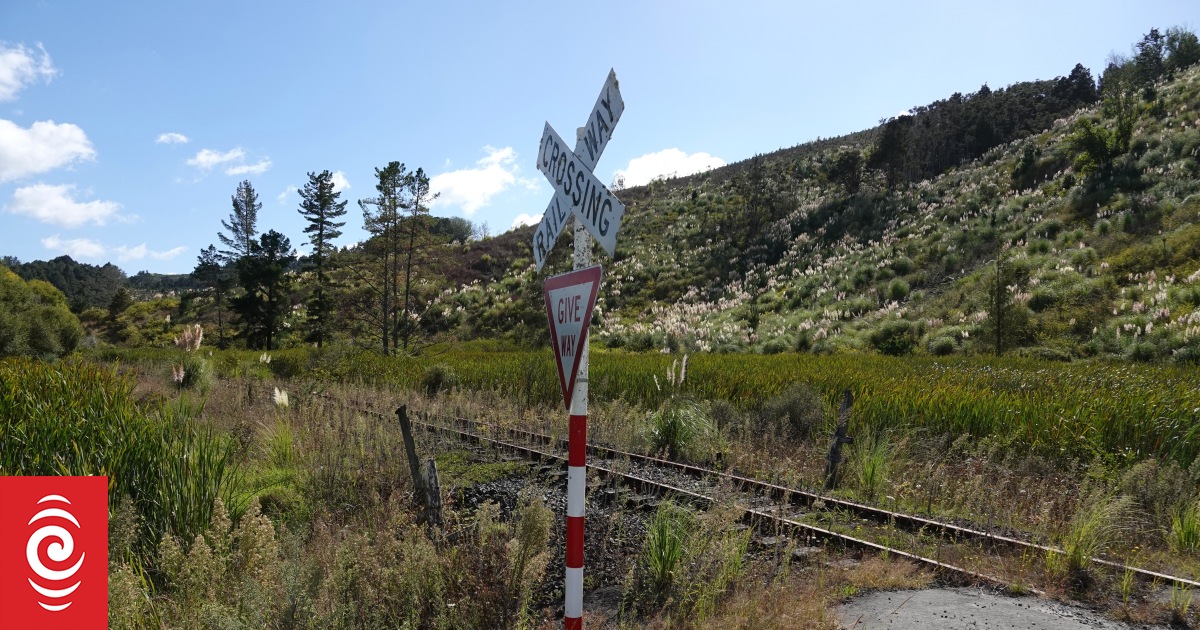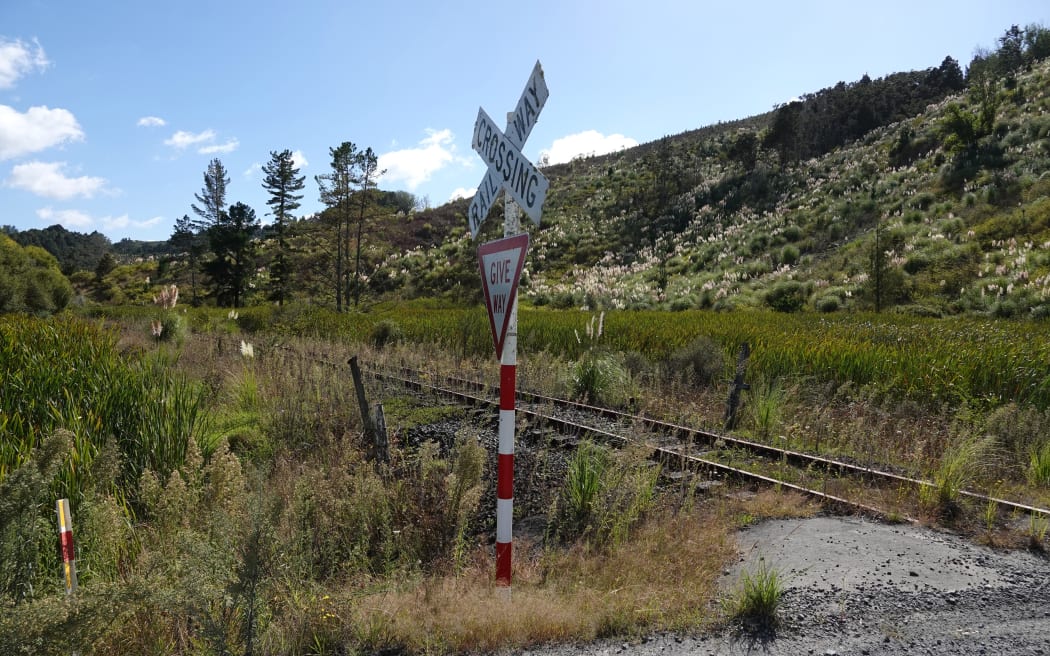
This section of Northland’s railway, near Motatau, hasn’t seen a train since 2016 – and plans to reopen the line are now on hold.
Photo: RNZ / Peter de Graaf
More than $30 million was spent reopening a mothballed Northland railway line before the partly-completed project was put on hold, figures obtained by RNZ show.
But KiwiRail says much of the spending was on materials such as sleepers, which can be used elsewhere or stored in case the project gets a green light in future.
KiwiRail mothballed the northern part of Northland’s 285km-long railway line in 2016, saying it was no longer viable.
Freight trains would continue to run from West Auckland to Fonterra’s dairy factory at Kauri, just north of Whangārei, but no further.
But in 2020, the Labour-NZ First government pledged tens of millions of dollars to bring the line back to life, all the way to its end point at the Ōtiria railyard, near Moerewa.
As part of that plan, thousands of concrete sleepers were cast to replace the existing wooden sleepers, which were coming to the end of their useful life.
The new sleepers were stacked up, ready for the upgrade, in roadside laybys or laid out along the railway, where they remain to this day.
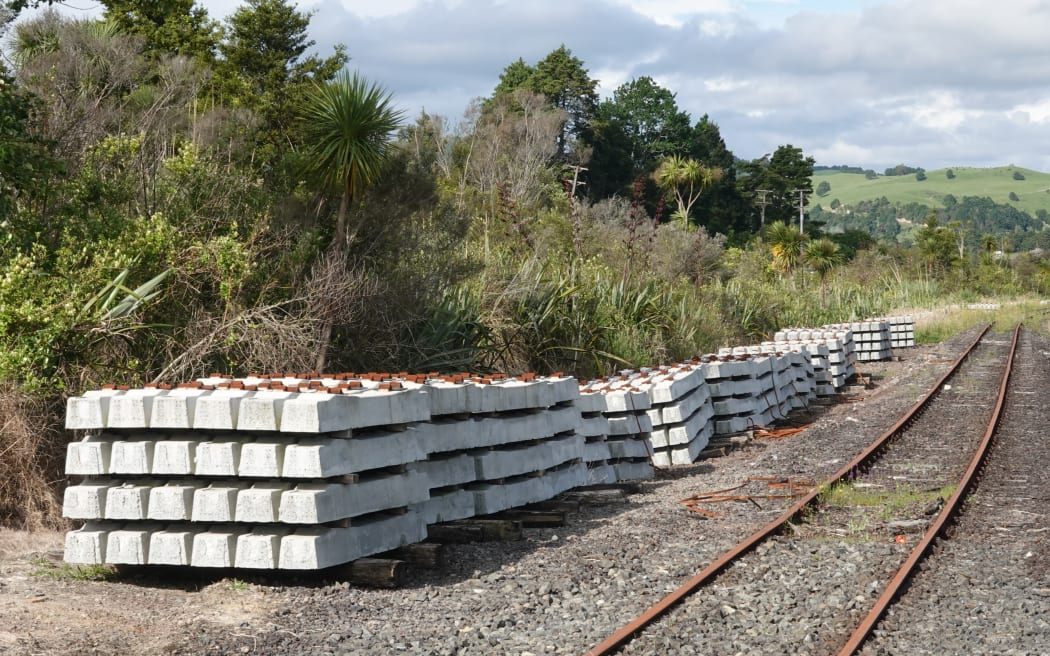
Railway sleepers are stacked by the thousands across the Far North for an upgrade that’s now on hold.
Photo: RNZ / Peter de Graaf
Figures obtained under the Official Information Act show $33.5 million was spent on the line from Kauri to Ōtiria, of which $26.5 million went on materials such as new sleepers and rails.
The balance was spent on design, project management, and clearing drains and vegetation.
KiwiRail chief planning and asset development officer David Gordon said the government-funded project was initially paused while the company engaged with hapū along the route.
RNZ understands some neighbouring landowners objected to the reopening of the line, saying it was subject to a Treaty claim, and had threatened to block the tracks.
Then in early 2023, Gordon said KiwiRail had to redirect its resources to the “massive job” of repairing the storm-damaged rail line south of Whangārei.
The Auckland Anniversary Weekend deluge and Cyclone Gabrielle a few weeks later wrecked the track in 200 places, with 35 sites requiring major engineering work to fix.
Those repairs were now coming to an end, with the last sections of track re-laid last weekend and freight trains expected to return in late July.
Gordon said work on the Kauri to Ōtiria line had been put on hold while KiwiRail continued its design work on a new rail link to Northport, Northland’s deepwater port at Marsden Point.
It made sense to align the two projects, he said.
A Marsden Point rail link would mean logs loaded at Ōtiria could be transported directly to Northport by train – instead of being taken to ports at Auckland or Tauranga, or rail-freighting goods from Ōtiria to Whangārei, then transferring them to trucks for the last 30km to Northport.
Gordon said KiwiRail was currently working on detailed design of the 19km spur line to Marsden Point, including work to reduce the initial cost estimate of almost $1 billion.
“The Kauri-Ōtiria rail upgrade will be wrapped into that wider project. We expect to provide information to the government by mid-2025, so it can consider funding to build the Marsden Point rail link,” he said.
He said the money spent on the rail upgrade had not been wasted.
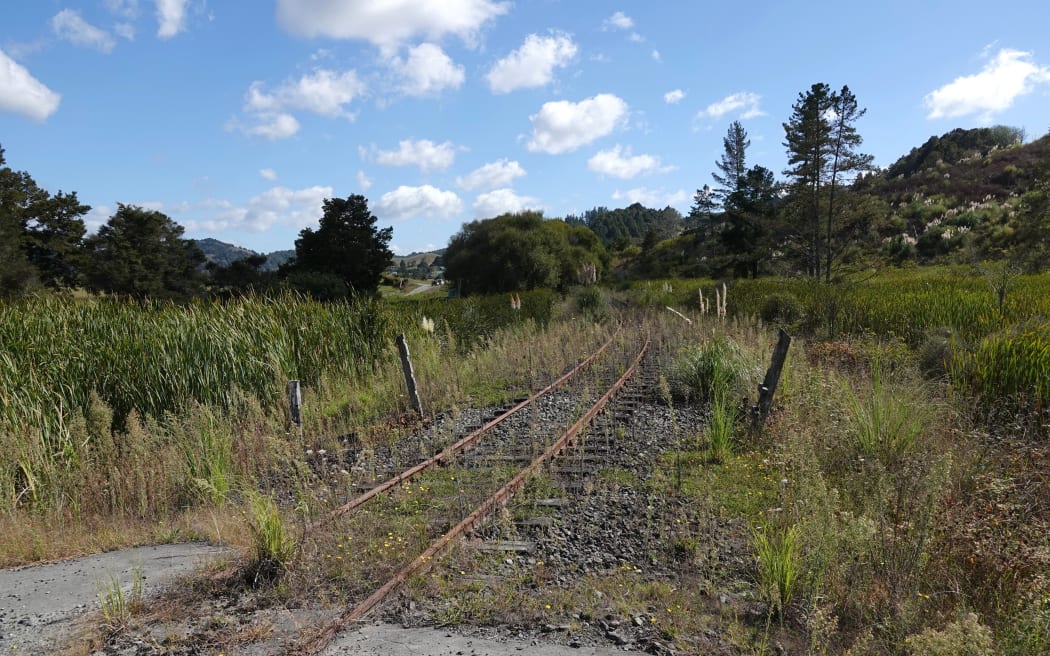
This section of Northland’s railway, near Motatau, hasn’t seen a train since 2016 – and plans to reopen the line are now on hold.
Photo: RNZ / Peter de Graaf
The scrub clearing and drainage improvements had to be done regardless, while the imported rails and Whangārei-made sleepers could be reused anywhere in the country.
“There’s no point at the moment of picking up the sleepers and moving them somewhere else, if we’re going to restart on the line. So they may as well stay there as anywhere, and be an object of some curiosity.”
Regional Development Minister Shane Jones – who announced the plan to reopen the Kauri to Ōtiria line in 2019 – said the lack of progress was “a matter of immense disappointment”.
Increased cost was one factor, but another was the behaviour of local hapū Ngāti Hine, he said.
“They have basically held the entirely of the North to ransom with their threats and their deluded claims of ownership. The railway track is akin to State Highway 1 or 10. It is owned by the Crown for public purposes,” Jones said.
But Ngāti Hine leader Pita Tipene said some whānau along the rail corridor opposed reinstatement of the railway line because KiwiRail had been “inept” in its approach to consultation, and given mixed or even contradictory messages.
“People who live along the line have been shown much disrespect for generations, so it’s no surprise at all that people should feel aggrieved. It beggars belief that all of a sudden Ngāti Hine is blamed for holding Northland to ransom.”
Tipene said consultation had improved recently with the new chief executive agreeing to meet locals, instead of the lower ranked staff who had been sent to past meetings.
Gordon said the economics of the Kauri to Ōtiria line had always depended on whether the Marsden Point rail link would go ahead.
When it was originally funded, construction of the Marsden Point link appeared imminent, but the decision had been deferred by successive governments.
“The current government may have a different perspective as well, so it was stopped for that reason. There was also a difference of views with some iwi about whether the reopening of the line should proceed,” Gordon said.
“Rather than try and pursue that while there was still doubt about the Marsden Point link, we elected to put those discussions to one side, focus on the Marsden Point business plan, and then, if that goes ahead, restart the conversations.”
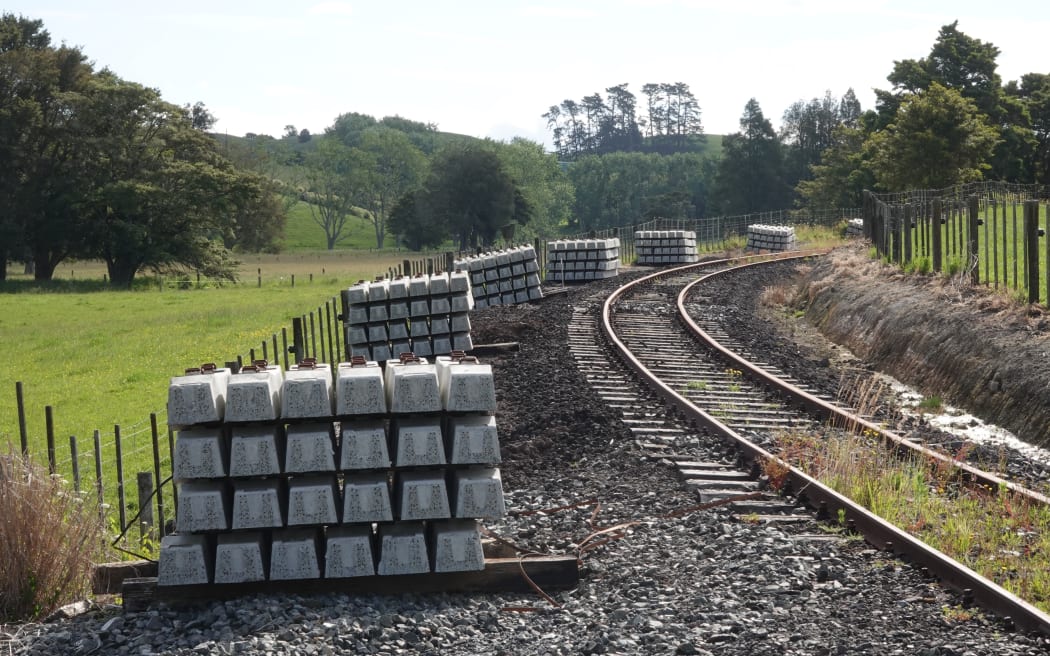
Railway sleepers are stacked by the thousands across the Far North for an upgrade that’s now on hold.
Photo: RNZ / Peter de Graaf
Northland rail by numbers*:
- $303m: Total government funding allocated to Northland rail since 2019.
- $173m: Sum allocated for essential renewals and capacity improvements. Includes upgrades between West Auckland and Whangārei to allow 18-tonne axle loads (as used on the rest of the North Island network); replacing old wooden sleepers with new concrete ones; lowering the track in 13 tunnels to fit modern shipping containers; replacing five ageing bridges.
- $40m: PGF funding to buy land for the Marsden Point rail link. More than 80 percent of the land needed has been purchased so far.
- $90m: Sum allocated to upgrade the line between Whangārei and the dairy factory at Kauri for heavier loads; reopening the mothballed line between Kauri and Ōtiria; upgrades to the Ōtiria container terminal site and log yard; upgrades and flood management work at the Whangārei rail yard.
- $33.5m: Amount spent so far on reopening the mothballed Kauri to Ōtiria line, which is now on hold. Includes $26.6m for materials such as sleepers and rail. The money was a mix of PGF and New Zealand Upgrade Programme funding.
- About $20m: Unspent funding that was to have been used to upgrade Ōtiria railyard and the track between Kauri and Ōtiria. May be reallocated to other projects, but no decisions have been made as yet.
* Figures supplied by KiwiRail under the Official Information Act.

